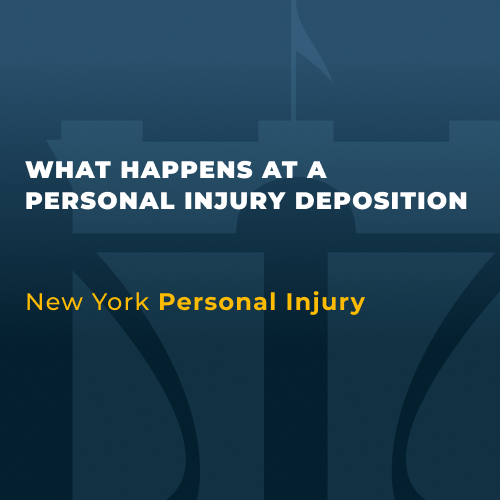
As a plaintiff in a personal injury case in New York, you might have to give testimony in a deposition. A deposition is a formal questioning session under oath where the defendant’s attorney will ask you questions about your injury and its circumstances. The information you provide during a deposition can significantly impact the outcome of your case, which is why it is crucial to understand what to expect and how to prepare for one.
Preparing for a Deposition
The success of your deposition will depend on how well you prepare for it. Here are some steps you can take to ensure that you’re ready and confident when it’s time to go under oath:
- Review all the documentation related to your case, including medical reports, witness statements, and other relevant records. It’s a good idea to refresh your memory about the details of your case so that you can provide accurate answers to the questions asked during the deposition.
- Familiarize yourself with the details of the incident that caused your injury. It’s essential to clearly understand what happened when it happened and why it happened.
- Be sure to have a lawyer represent you during the deposition. An experienced New York personal injury attorney can help prep you for the deposition and provide valuable advice on the questions you may be asked.
The Deposition Process
A deposition is a formal questioning session wherein the other party’s attorney asks specific questions about your claim. The deposition includes a court reporter recording questions and answers that are later transcribed for the case file. Here’s what you can expect during the deposition process:
- The defendant’s attorney will ask you questions about the incident that caused your injury, including how it happened, where it happened, and what you were doing at the time.
- You will be asked about your injuries, including when they occurred, how they occurred, and what treatment you received.
- The defendant’s attorney may also ask you questions about your work history, daily activities, and other details that may help them build their defense.
- They may ask you questions about your medical history, including any prior illnesses or injuries, surgeries or hospitalizations, and any medications you are taking.
The deposition is not a trial, and there won’t be a judge present to rule on the admissibility of evidence or the relevance of questions. The deposition is simply an opportunity for the defendant’s attorney to gather information and build their case. However, what you say could be used against you later in the trial. It’s essential to take the deposition seriously, even though no judge or jury is present.
Your attorney can raise objections to questions to preserve those objections for trial. Your attorney will also assist, advising you to refrain from answering a question if necessary. The deposition may last several hours, and you will be under oath for the entire time. Try to remain focused and composed throughout the process.
Tips for a Successful Deposition
You should always be prepared, professional, and respectful. The defendant’s attorney is looking for any information that supports their case. No matter what opposing counsel tries to get you to believe, they are not on your side.
Here are some tips that can help you have a successful deposition:
- Be respectful and professional during the deposition. Avoid getting defensive or argumentative, and focus on providing clear and concise answers.
- Answer questions truthfully and accurately. If you don’t know the answer to a question, say so.
- Don’t exaggerate or say something that isn’t true.
- If you are unsure about a question or feel irrelevant, you should politely ask the defendant’s attorney to clarify or rephrase it.
- Remain calm and focused throughout the process. It’s easy to get frustrated, especially if the deposition lasts several hours. You might need to ask for a break to confer with your attorney, use the restroom, etc.
- Make a good impression. The court reporter will transcribe your testimony, which may be used in court. You want to make a good impression and show the defendant’s attorney you’ll be a strong witness on the stand at trial.
A deposition is an integral part of the discovery process in a New York personal injury claim. Ensure your deposition is a success by preparing and understanding what to expect. Only provide the information needed to support your case. What you say during your deposition can significantly impact the outcome of your case, so it is crucial to be prepared and professional throughout the process.
Role of Your Attorney in a Deposition
Your attorney can help you understand the legal process, prepare for the deposition, and provide guidance throughout the deposition. Here’s what you can expect from your attorney during a deposition:
Preparation for the Deposition
Your attorney can help you review all the relevant documents related to your case and prepare you for the types of questions you will be asked during the deposition. Your attorney can also advise you on how to present yourself during the deposition and respond to questions professionally and effectively.
Raising Objections
The defendant’s attorney may ask questions that are irrelevant or inappropriate. If this happens, your attorney can object to the question and argue that it is irrelevant to your case.
Support
Your attorney can provide you with legal support and guidance throughout the deposition, helping you understand the legal process and answering any questions you may have about your rights and obligations. Your attorney will protect your rights and ensure the defendant’s attorney treats you fairly and respectfully.
Having your attorney present during a deposition can help ensure that your rights are protected and that the information you provide is used in the best possible way to support your case.
Contact Anthony A. Ferrante Today
If you have any questions or concerns about your deposition, it is best to consult an experienced personal injury attorney who can provide you with the guidance and support you need. Mr. Ferrante has over a decade of experience representing injured victims in New York. Go through a deposition only with legal representation, or you risk jeopardizing your case. Please contact our office today to learn more about how Mr. Ferrante can assist you with your personal injury claim and possible deposition testimony.


















